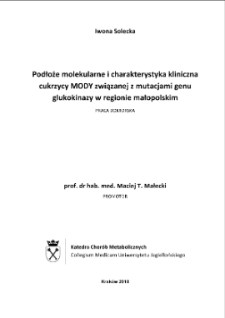Obiekt
Tytuł: Podłoże molekularne i charakterystyka kliniczna cukrzycy MODY związanej z mutacjami genu glukokinazy w regionie małopolskim
Abstrakt:
Monogenowa, autosomalnie dominująca cukrzyca GCK-MODY jest związana z mutacją genu enzymu regulującego wydzielanie insuliny – glukokinazy. Choroba ma przebieg łagodny, hiperglikemia nie ulega progresji w czasie, niewielkie jest ryzyko przewlekłych powikłań cukrzycy, a chorzy zwykle wymagają jedynie postępowania dietetycznego.Celem niniejszej pracy było badanie podłoża molekularnego oraz wybranych cech klinicznych GCK-MODY w regionie Polski Południowo-Wschodniej. Zidentyfikowano 42 rodziny GCK-MODY, w których stwierdzono 27 różnych mutacji, w tym 5 nowych, dotychczas nie opisanych w innych populacjach światowych. Pacjentów z GCK-MODY scharakteryzowano pod kątem parametrów antropometrycznych, biochemicznych, schorzeń współistniejących, przewlekłych powikłań cukrzycy oraz sposobu leczenia. Grupę tą porównano z grupą kontrolną osób zdrowych. Pacjenci z GCK-MODY charakteryzowali się się wysokim stopniem penetracji mutacji, brakiem otyłości i w większościprzypadków brakiem cech zespołu metabolicznego. Częstość nadciśnienia tętniczego nie różniła się istotnie od grupy kontrolnej. Nie stwierdzono ciężkich postaci przewlekłych powikłań cukrzycy.Po zakończeniu badania oceniono wpływ diagnozy molekularnej na postępowanie terapeutyczne, obraz kliniczny oraz stopień wyrównania metabolicznego. Wszyscy chorzy stosujący dotychczas insulinoterapię zaprzestali jej stosowania. Zmniejszyła się lic ; zba pacjentów stosujących leki doustne, a zwiększyła – stosujących dietę cukrzycową. Zmiana postępowania terapeutycznego pozostała bez wpływu na stopień wyrównania metabolicznego.
Miejsce wydania:
Stopień studiów:
Dyscyplina:
Instytucja nadająca tytuł:
Promotor:
Data wydania:
Identyfikator:
Sygnatura:
Język:
Prawa dostępu:
Kolekcje, do których przypisany jest obiekt:
Data ostatniej modyfikacji:
30 gru 2024
Data dodania obiektu:
1 lip 2020
Liczba wyświetleń treści obiektu:
231
Liczba wyświetleń treści obiektu w formacie PDF
100
Wszystkie dostępne wersje tego obiektu:
http://dl.cm-uj.krakow.pl:8080/publication/4361
Wyświetl opis w formacie RDF:
Wyświetl opis w formacie OAI-PMH:
| Nazwa wydania | Data |
|---|---|
| ZB-130621 | 30 gru 2024 |
Obiekty
Podobne
Solecka, Iwona
Grzanka, Małgorzata
Skupień, Jan
Hohendorff, Jerzy
Polimorfizmy w wybranych genach kandydatach dla insulinooporności a predyspozycja do cukrzycy typu 2
Wanic, Krzysztof
Frey, Jakub
Lizis-Kolus, Katarzyna
Wątor, Gracjan

